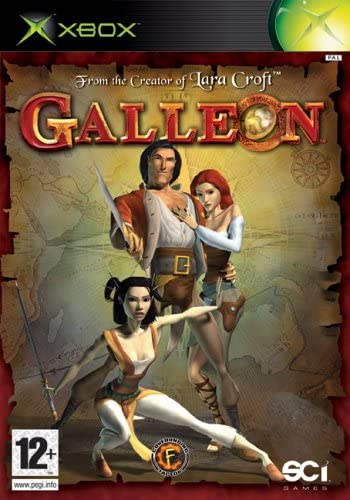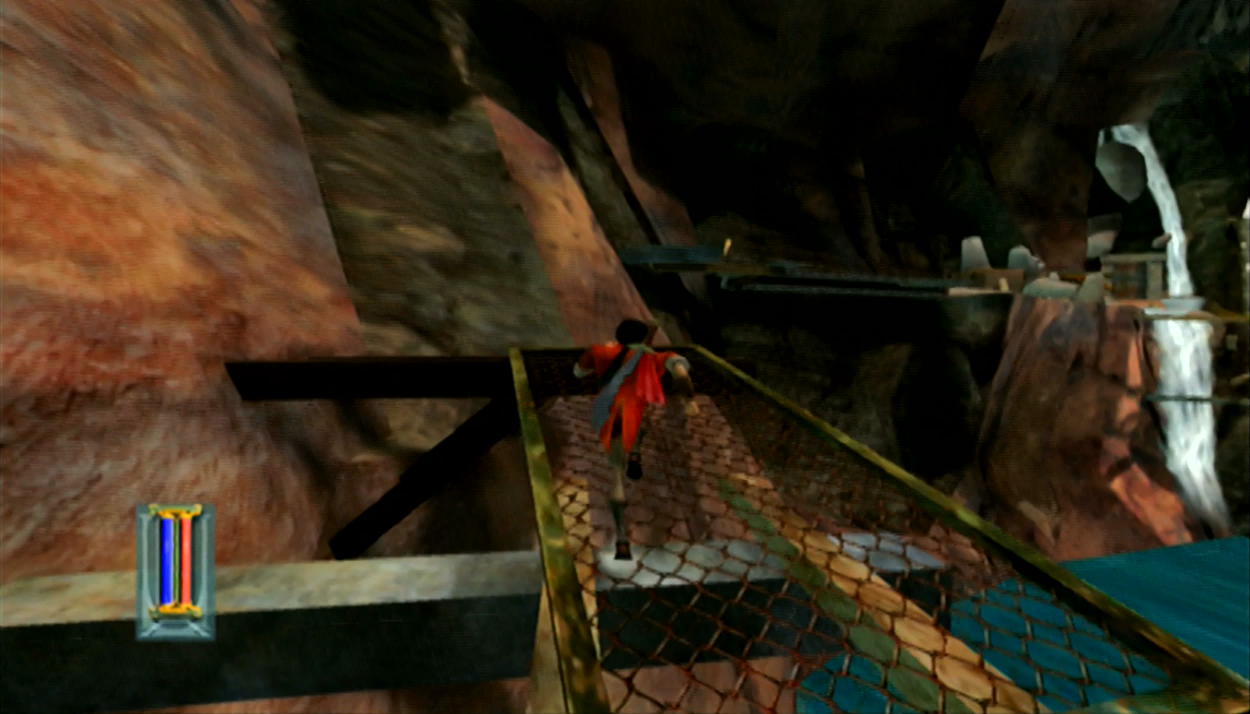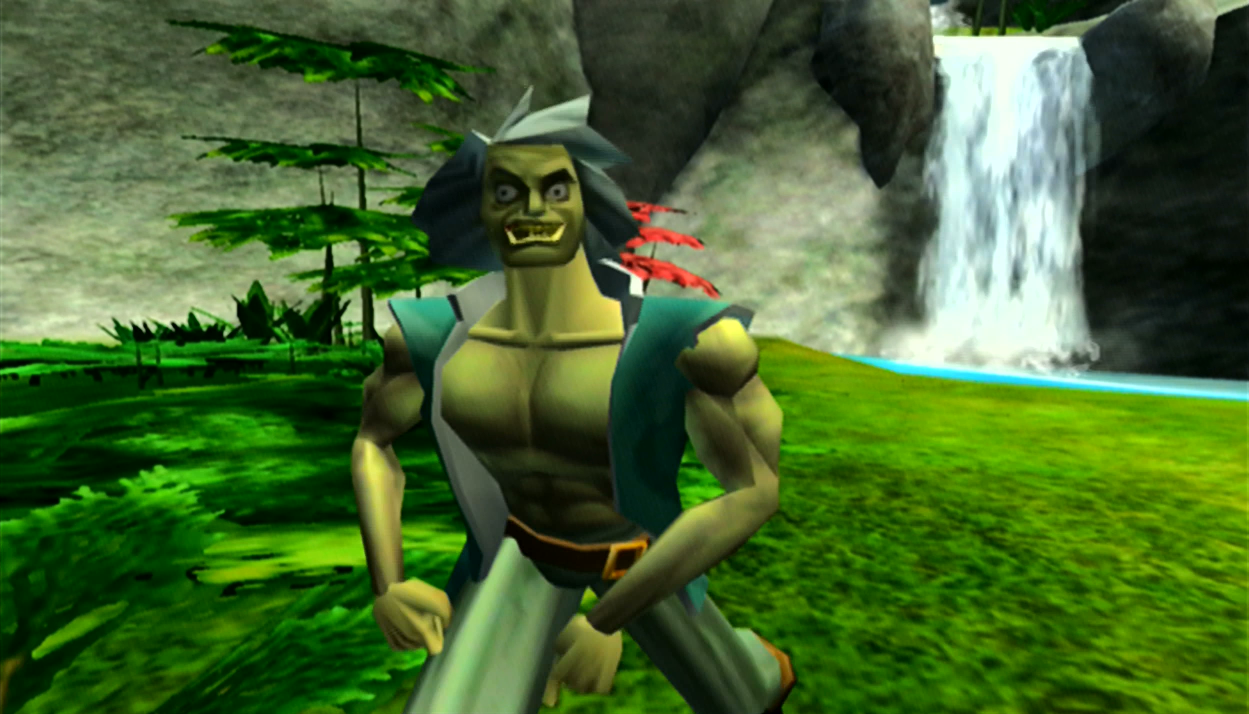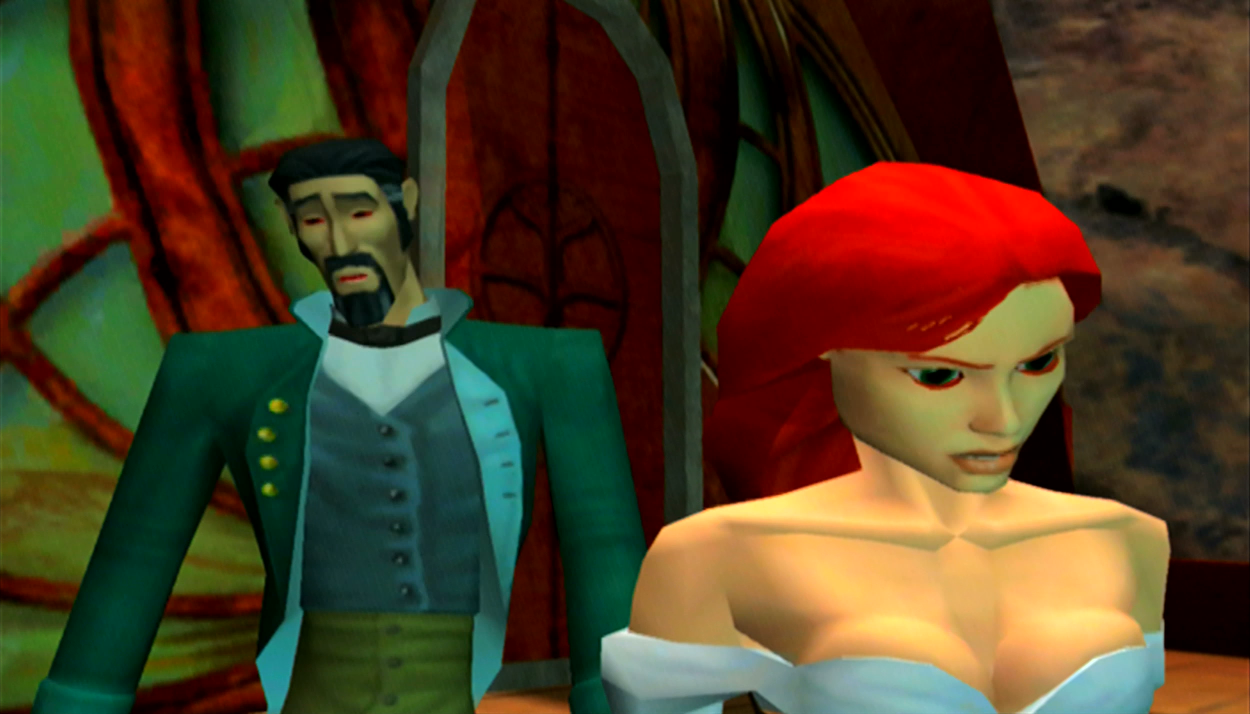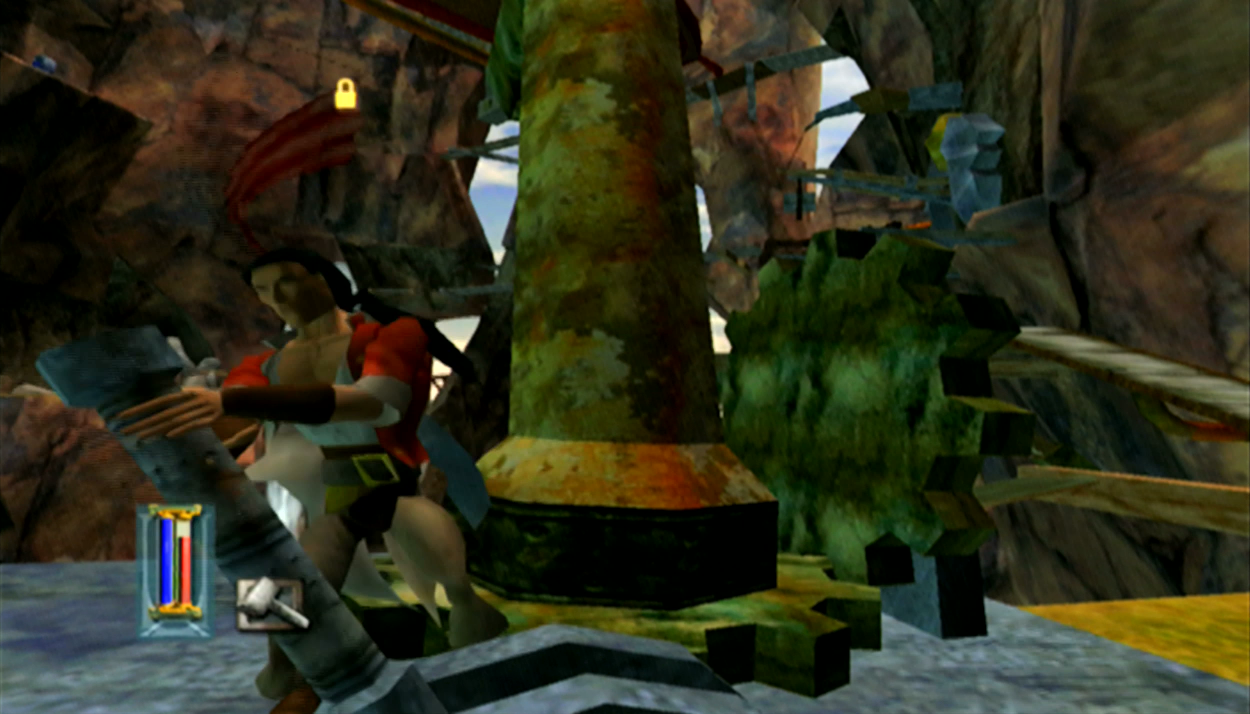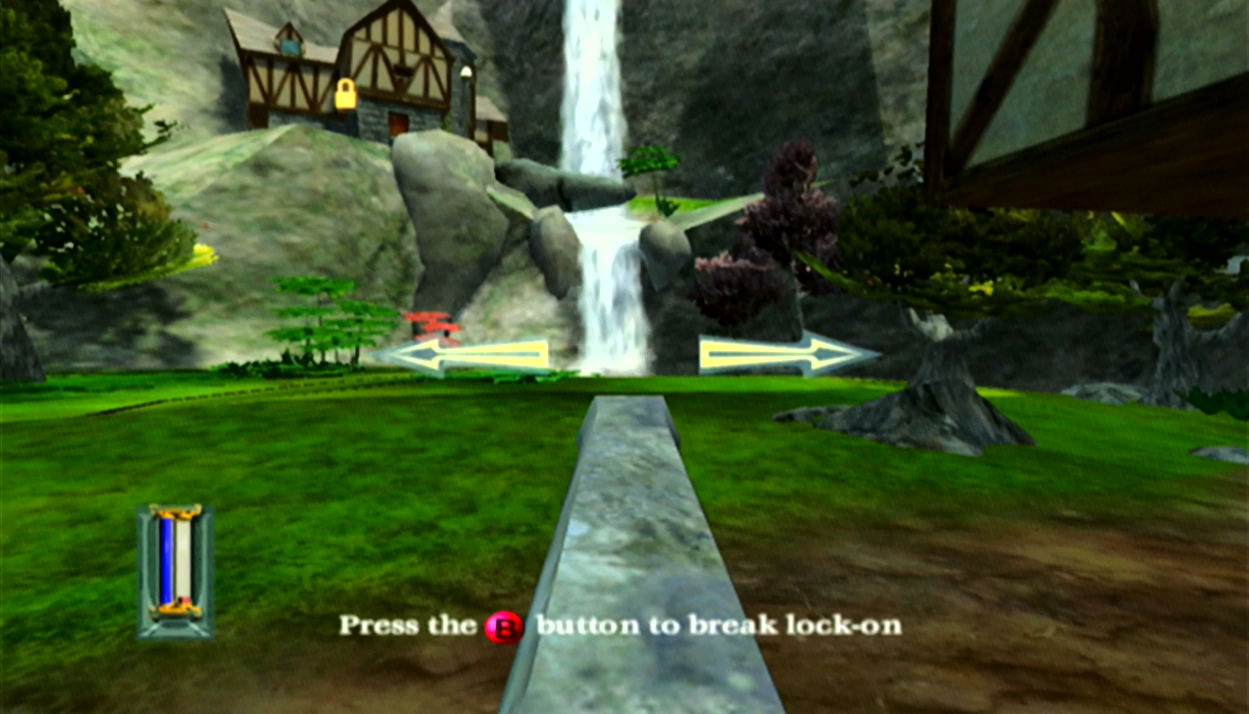GALLEON (XBOX)
Galleon was to be the ambitious independent project of Toby Gard, frustrated by the a lack of creative freedom offered him by Core Design after his contribution towards the creation of Tomb Raider. From 1997 to 2004, a whirlwind development would see the title crossing console generations, switching publisher following its cancellation and plenty of other issues. After seven years, the swashbuckling adventure would finally grace Xbox, but the wait would prove fruitless. Not lacking in creativity or ideas, Galleon is instead submerged by uneven gameplay that somehow proves both innovative and dated at the same time: trying to manage the struggles of 3D adventures, but arriving after several stellar releases would work around these issues.
Galleon concerns the exploits of Rhama Sabrier, a suave captain whose bare chest and potent charm woos many a woman upon sight. After investigating a ship for Dr. Areliano, his servant Jabez pulls a double-cross that results in the good doctor’s death as well as the destruction of his home. This sets in motion a journey across sea and land to stop this underhanded crook from gaining too much power while Faith, Areliano’s daughter, accompanies the crew. It sounds quite dark, but the cheesy dialogue and goofy movie quote theft sees the tongue firmly in cheek. The oozing charisma of the lead helps, and his interaction with fairly layered characters helps. This tone blends well with the cartoon-style aesthetics, and expressive facial animations add an immense amount.
There's plenty of scope, but Galleon is not one of the Xbox's most impressive-looking games
Something of an odd time capsule, you can see a lot of holdover elements from Gard’s previous work on Tomb Raider. This adventure, divided into seven levels, showcases expansive stages that are large, explorable and colourful. Rhama’s exploits are split between puzzle solving, platforming across hazards and combat with either swords or fists. Collectibles are abundant in each level, with the game tracking your stats for health pick-ups, shootable pistols and treasures which are returned to your ship. There are tons of these between most stages, and while the story takes around nine hours to beat without much exploration, you can easily bump this up exploring further, including optional deathtraps that reward bonus swords.
Sadly, things decline as soon as you gain control of the hero. Unlike other adventure games of the time, which either used static angles or controlled cameras, there is no direct control of the playing perspective. Instead, the camera turns to whichever direction you point Rhama, with the right analogue instead mapped to submenus such as giving orders or healing. Sadly, this camera system feels very unwieldy, especially when you’re forced to navigate tight spaces and it gets stuck. The controls hamper this as well, with movement speed dictated by how harshly you push the left analogue stick. But movement feels extremely odd, suffering from an almost floaty physics base that sees the captain attaching to ceilings upside down, running over objects far too often when trying to climb, and even falling through the floor at one point. Every physical action you perform in this game feels clumsy and uncomfortable, harming most of the gameplay along the way.
Sadly, things decline as soon as you gain control of the hero. Unlike other adventure games of the time, which either used static angles or controlled cameras, there is no direct control of the playing perspective. Instead, the camera turns to whichever direction you point Rhama, with the right analogue instead mapped to submenus such as giving orders or healing. Sadly, this camera system feels very unwieldy, especially when you’re forced to navigate tight spaces and it gets stuck. The controls hamper this as well, with movement speed dictated by how harshly you push the left analogue stick. But movement feels extremely odd, suffering from an almost floaty physics base that sees the captain attaching to ceilings upside down, running over objects far too often when trying to climb, and even falling through the floor at one point. Every physical action you perform in this game feels clumsy and uncomfortable, harming most of the gameplay along the way.
Platforming lacks the responsiveness or sharpness of games like Prince of Persia: The Sands of Time and while Rhama can suffer pretty sizeable falls without dying, he’s not invincible, especially when there are hazards like lava. Swimming isn’t much better, with the camera struggling to keep up with sharp movements. Combat feels light and unsatisfying, with weak combos and strikes turning swashbuckling into dishwashing – though a handful of powers gained from continuous hits do the job nicely. Enemies rarely put up a fight, but frustrations like taking damage from enemies bouncing off the wall and cheap sub-bosses can irritate. Bigger foes, meanwhile, all boil down to the same mounting then stabbing in the head pattern, which grows old quickly. Galleon’s elements are ultimately too disparate to come together, and while brief moments can gel into a fun experience, you can count these occasions on the fingers of two hands. Even slight deviations, such as manning a mech suit to face a Hydra, feel clunky.
Galleon’s protracted development shows most prominently in its visuals, proving one of the Xbox’s least flattering games. The low poly characters are really ugly, environments are poorly textured and animations appear wonky compared to competing games. While a colourful palette and solid lighting redeem the performance somewhat, you’ll often be left gawking at how poor the game looks. The sound is also low quality at points, as while the voicework is decently camp and fits the tone, you’ll struggle to hear it sometimes thanks to poor mixing. Audio effects are weak and the music is really nondescript, with a few tracks repeatedly looping during key moments and little else outside of combat, chase runs and bosses.
Galleon’s protracted development shows most prominently in its visuals, proving one of the Xbox’s least flattering games. The low poly characters are really ugly, environments are poorly textured and animations appear wonky compared to competing games. While a colourful palette and solid lighting redeem the performance somewhat, you’ll often be left gawking at how poor the game looks. The sound is also low quality at points, as while the voicework is decently camp and fits the tone, you’ll struggle to hear it sometimes thanks to poor mixing. Audio effects are weak and the music is really nondescript, with a few tracks repeatedly looping during key moments and little else outside of combat, chase runs and bosses.
Galleon tries its hand at a number of action/adventure tropes but cannot disassociate itself from its awkward controls
Galleon would prove a game out of its time, looking to solve problems which, by time it’s elongated development had finally concluded, had been fixed in superior ways by competing adventure games, meaning it was almost shipwrecked on arrival. It’s a shame, because the prospect of swashbuckling across the seas could have been a fun take on the action/adventure genre. Sadly, its controls and movement cause frustration with a majority of the mechanics leaving players to wrestle with these, rather than being free to feel like an epic ship’s captain. Unless you can stomach these flaws and need an adventure fix on the Xbox, this one is best left at the bottom of the ocean.
|
|
VERDICT
"...the prospect of swashbuckling across the seas could have been a fun take on the action/adventure genre. Sadly, a majority of the mechanics leaving players to wrestle with Galleon's control issues. A game out of its time." OVERALL: 5/10 |
MORE NAUTICALLY THEMED GAME REVIEWS
